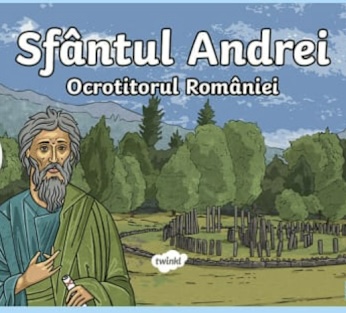On November 30, Romania celebrates the Feast of Saint Andrew, a deeply significant day in the Orthodox calendar and a public holiday across the country. Known as the Protector of Romania, Saint Andrew holds a special place in the hearts of Romanians, not just for his role in the Christianization of these lands, but also as a unifying symbol of faith, culture, and national identity.
Saint Andrew’s Role in Romania’s Spiritual History
Saint Andrew, one of the twelve apostles of Jesus, is believed to have brought Christianity to the territory that is now modern-day Romania. According to tradition, he preached the Gospel in the region of Scythia Minor, an area encompassing parts of Dobrogea, where traces of his journey remain. The Cave of Saint Andrew, located near Ion Corvin in Constanța County, is a revered pilgrimage site. This natural sanctuary is said to have sheltered the apostle during his missionary work and is now a sacred place of prayer and reflection.
The significance of Saint Andrew in Romanian Orthodoxy is so profound that he was declared the patron saint of Romania in 1997 by the Romanian Orthodox Church. His feast day not only honors his life and work but also serves as a reminder of the country’s Christian roots.
Traditions and Customs on Saint Andrew’s Day
Saint Andrew’s Day in Romania is more than a religious observance: it is intertwined with folklore and age-old traditions. On the night of November 29, Romanians engage in rituals believed to ward off evil spirits, ensure a bountiful harvest, and even predict the future. Among the most fascinating customs are:
• Warding Off Strigoi: Strigoi are restless spirits or vampires in Romanian folklore. To protect their homes, people spread garlic on windows, doors, and barns, a practice steeped in superstitions from pre-Christian times.
• Wheat Planting: Families plant wheat grains in small pots as a symbol of prosperity and fertility. By New Year’s Eve, the sprouted wheat is believed to predict the household’s fortune for the coming year.
• Marriage Predictions: Unmarried women perform rituals on the eve of Saint Andrew’s Day to dream of their future spouse. One popular method involves placing a sprig of sweet basil under their pillow.
These customs, a blend of pagan and Christian traditions, reflect the richness of Romanian culture and its enduring connection to the past.
Saint Andrew’s Day: A National Symbol of Unity
In a country where faith and tradition remain cornerstones of identity, Saint Andrew’s Day is a unifying celebration. It brings together Romanians from all walks of life to honor their shared heritage and reflect on the values of faith, resilience, and community. The apostle’s message of love and unity resonates strongly in a world often divided by conflict and uncertainty.
Personal Reflection
As I immerse myself in my research in the Danube Delta, I find a deep connection between the region’s history and its spiritual legacy. I am reminded of the power of faith to inspire and transform societies. The celebration of Saint Andrew’s Day feels particularly meaningful here, in the cradle of Romanian Christianity.
On this day, let us honor Saint Andrew’s contributions to Romania’s spiritual journey and reflect on how his values of compassion and unity can guide us in our personal and collective lives.
What are your thoughts about Saint Andrew’s Day? Share your traditions or reflections in the comments—I would love to hear how this day resonates with you!

